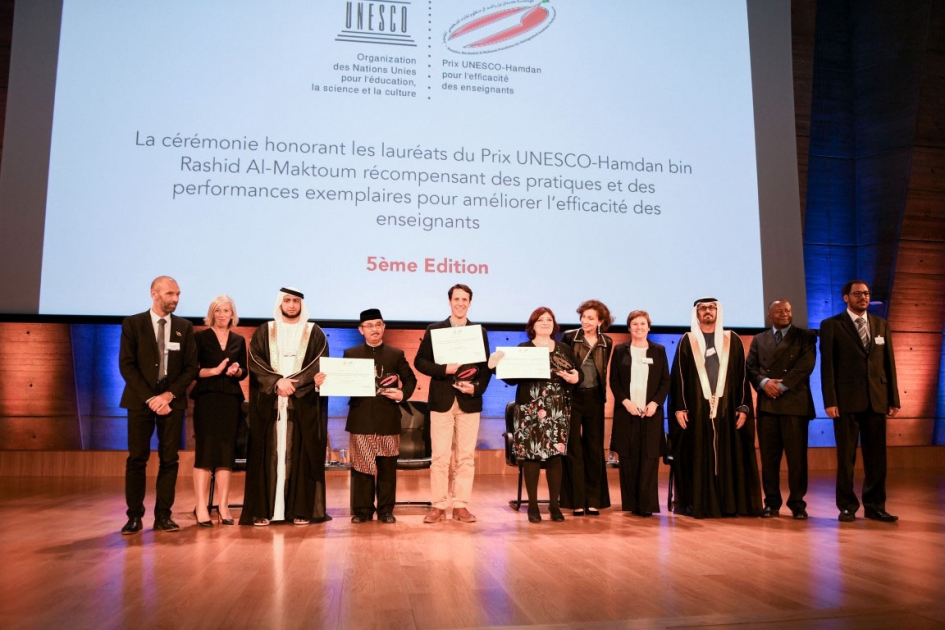
Three laureates from Chile, Indonesia, UK awarded UNESCO-Hamdan Prize
Three laureates from Chile, Indonesia and the United Kingdom, UK, who were awarded the 5th UNESCO – Hamdan Bin Rashid Al Maktoum Prize, were honoured by Sheikh Rashid bin Hamdan bin Rashid Al Maktoum and Audrey Azoulay, Director-General of UNESCO, at a grand award presentation ceremony at the UNESCO headquarters in the French capital, Paris.
The award recognises projects that have made an outstanding contribution to improving the quality of teaching.
They presented certificates, prizes and cash awards worth $100,000 each to the three winning programmes designed to empower teachers. These are from the Center for Mathematic Modeling of the University of Chile, the Diklat Berjenjang project of Indonesia and the Fast-track Transformational Teacher Training Programme of the UK. The ceremony was held as part of the World Teachers' Day celebrations at the UNESCO Headquarters.
Audrey Azoulay, Director-General of UNESCO, appreciated the generosity of H.H. Sheikh Hamdan bin Rashid Al Maktoum, Deputy Ruler of Dubai and UAE Minister of Finance, patron of the prize, and the vital charitable and humanitarian role played by the Hamdan bin Rashid Al Maktoum Foundation for Distinguished Academic Performance in areas of medicines, scientific research, humanitarian assistance and education.
She highlighted the role of the prize in improving the performance of teachers in the Third World, particularly in Africa and some Asian countries, as it encourages teachers to develop their capacities and skills through moral and financial incentives and specialised training programmes, organised by UNESCO in collaboration with the Board of Trustees of the prize.
She thanked Sheikh Hamdan for his generous contributions that helped UNESCO to implement its programmes and projects on education and the conservation of world heritage.
Addressing the gathering on behalf of Sheikh Hamdan, Hussain bin Ibrahim Al Hammadi, UAE Minister of Education and Chairman of the Board of Trustees of the Foundation, affirmed that the Foundation would continue to support UNESCO's programmes to develop learning techniques and methods, curricula and educational institutions in poor countries so as to create favourable and healthy learning conditions for deprived children.
Al Hammadi announced the launch of a world centre for talents under the sponsorship of UNESCO. ''It will be the first international platform to allow scientifically and technologically gifted persons to unlock their creativity in the service of the humanity,'' he said.
The Center for Mathematic Modeling of the University of Chile was awarded the Prize for Outstanding Practice and Performance in Enhancing the Effectiveness of Teachers for its Suma y Sigue: Matem?tica en l?nea (Adding it up: Mathematics online) programme which was developed to address the performance gaps in mathematics between students from different socioeconomic backgrounds and improving the quality of mathematics teaching in general. It is a "learning by doing" programme organised by grade levels and curricula, enabling teachers to focus on their specialised area of mathematics teaching. It blends face-to-face sessions with intensive virtual instructions. The programme is scalable, easily accessible by teachers in remote areas, and promotes inclusion.
The Diklat Berjenjang project from Indonesia won the award for bringing quality professional development to early childhood teachers, notably in the poorest and most remote areas. It helps meet Indonesia’s needs for teachers skilled in creating stimulating learning environments for young learners. It helps identify potential teacher trainers and provides step-by-step written guides, follow-up assignments and exchanges.
The Fast-track Transformational Teacher Training Programme from the UK was selected for its highly innovative and impactful approach to training teachers in various professional environments in Ghana. It promotes child-centred and play-based pedagogy in early education to replace traditional talk-chalk disciplinarian methods. Practising teachers receive a two-year training, combining workshops with smaller peer group meetings in which they are paired on the basis of their complementary strengths to engage in classroom observations and in-class coaching.
The three winners were selected from 150 nominations submitted by the governments of UNESCO’s member-states and UNESCO partner-organisations on the recommendation of an international jury of educational professionals.
Established in 2009 with funding from H.H. Sheikh Hamdan bin Rashid Al-Maktoum, the prize is awarded every two years to projects that have made outstanding contributions to improving the quality of teaching and learning, especially in developing countries or within marginalised or disadvantaged communities.



























